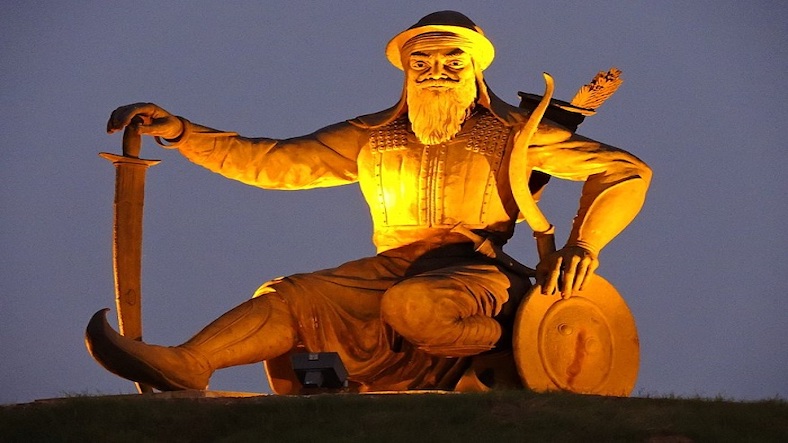Banda Singh Bahadur (1670-1716) was a Sikh military commander and spiritual leader who played a significant role in the history of the Sikh faith. He is remembered for his efforts to establish Sikh rule in the region of Punjab and for his role in leading the Khalsa army against the Mughal Empire.
Here are some key aspects of Banda Singh Bahadur's life and contributions:
- Early Life and Conversion to Sikhism: Banda Singh Bahadur was born as Lachman Dev in 1670 in Rajouri, Jammu and Kashmir, India. He was originally a Hindu but later converted to Sikhism under the influence of Guru Gobind Singh, the tenth Guru of the Sikhs.
- Leadership of the Khalsa: After the death of Guru Gobind Singh, Banda Singh Bahadur emerged as a prominent leader of the Sikh community. He was chosen to lead the Khalsa, the collective body of baptized Sikhs.
- Rebellion Against Mughal Rule: Banda Singh Bahadur led a rebellion against the oppressive rule of the Mughal Empire in Punjab. He aimed to establish a Sikh state based on principles of justice and equality.
- Capture of Sirhind: Banda Singh Bahadur's forces captured the city of Sirhind in 1710 after defeating the Mughal governor Wazir Khan. This victory marked a significant achievement in the struggle against Mughal authority.
- Establishment of Sikh Rule: Banda Singh Bahadur established a Sikh administration in the regions he captured. He abolished oppressive taxes and introduced policies that were more equitable for the common people.
- Battle of Chappar Chiri: In 1710, Banda Singh Bahadur faced a formidable Mughal army led by Wazir Khan at the Battle of Chappar Chiri. Despite being outnumbered, the Sikh forces achieved a decisive victory in this battle.
- Capture and Execution: However, Banda Singh Bahadur's rule was short-lived. In 1715, the Mughals launched a counteroffensive and Banda Singh Bahadur was captured along with his companions. He was subjected to brutal torture and was executed in 1716.
- Legacy: Banda Singh Bahadur is remembered as a heroic figure in Sikh history who resisted tyranny and fought for justice. His efforts to challenge the Mughal rule and his commitment to Sikh principles of equality and righteousness are admired by Sikhs worldwide.
- Religious Significance: Banda Singh Bahadur's sacrifices have made him a revered figure in Sikhism. He is often remembered for his dedication to the Sikh faith and his courage in the face of adversity.
Banda Singh Bahadur's legacy continues to inspire Sikhs and others who admire his commitment to justice, equality and the principles of Sikhism. His story is a testament to the resilience of those who stand up against oppression and fight for a better world.
Thanks for reading the about this great personality on our peoples blog, for more such great people read our peoples blog articles.










